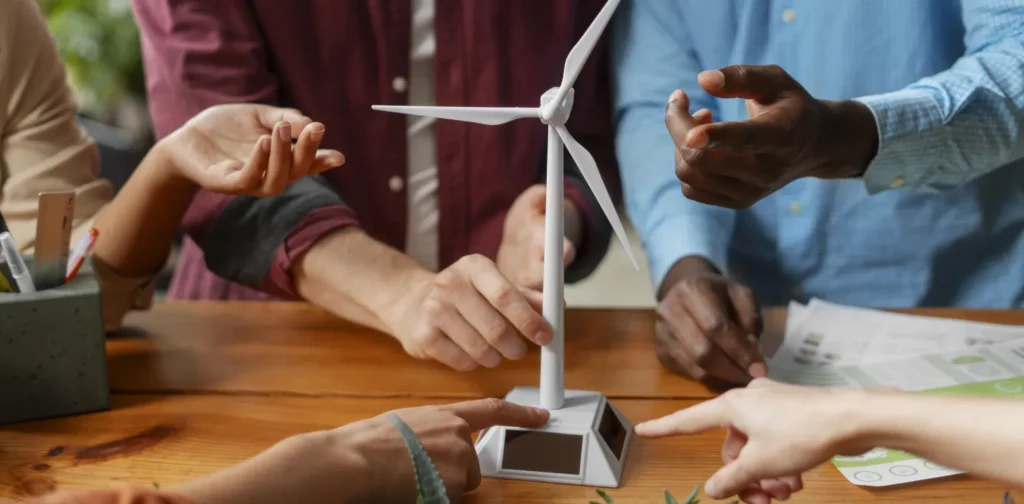How an Open-Source Wind Turbine Model Enables Rural Electrification Movements Worldwide

Photo by Freepik
Energy is essential in our lives. Nowadays, electricity has become a primary energy source that powers devices and lights, enabling human activities regardless of the time of day. Unfortunately, many communities still lack access to electricity, such as those who live in remote areas, away from the bustle of metropolitan life. In a collective effort to improve the situation, rural electrification movements around the world utilize an open-source wind turbine manual to help communities without electricity generate their own energy.
The Dual Issues of Electricity
The world is highly dependent on electricity. In 2023, global electricity demand grew by 2.2%, and total consumption is predicted to exceed 1,000 TWh by 2026. Despite ongoing global efforts and advocacy to transition away from fossil fuel toward more sustainable energy generation using renewable sources, only 30% of our electricity came from renewables in 2023.
Environmental sustainability aside, more than 745 million people still live with limited or no access to electricity. While this is a significant improvement from previous years, progress is still too slow to meet Sustainable Development Goal 7, in which everyone has access to affordable, reliable, and modern energy. Therefore, tackling global electricity issues means addressing both the access to electricity and the sustainability of its generation.
From Open-Source Solution to Rural Electrification Movements
An open-source wind turbine manual called the Piggott’s turbine was released in 2008. It provides detailed instructions on how to build a wind turbine using readily available materials, simple techniques, and tools. With six designs to choose from, the model has been used in many rural electrification projects around the world.
Among them is 500RPM, a non-profit organization that helps rural communities in Argentina build low-cost wind turbines. Inspired by the wind turbine manual and understanding the potential of wind energy in Argentina, they work on sharing practical and theoretical knowledge on wind turbines to rural communities so they can create their own electricity. So far, they have reached about 2,500 people in 12 provinces.
Another example is Wind Empowerment, an association of various non-profits, cooperatives, and educational institutions that promote clean wind energy and collaborate on rural electrification efforts and volunteer initiatives. Some of their projects include using wind energy to electrify water pumping systems in Argentina and India and providing electricity to rural health posts in Nepal by building the capacity of local practitioners.
Knowledge Sharing for Grassroots Initiatives
Best practices in sustainable development include a range of solutions, from policy interventions to technical innovations. They should be shared, encouraged, and widely adopted to tackle the world’s wicked problems. Knowledge sharing via open-source, low-cost, low-tech solutions is one way to help mainstream and scale up sustainable practices worldwide. By embracing open-source technology and supporting grassroots initiatives it inspires, communities are empowered to create a more sustainable, equitable future for everyone.
Editor: Nazalea Kusuma

Co-create positive impact for people and the planet.
Amidst today’s increasingly complex global challenges, equipping yourself, team, and communities with interdisciplinary and cross-sectoral insights on sustainability-related issues and sustainable development is no longer optional — it is a strategic necessity to stay ahead and stay relevant.
Dinda Rahmania
Dinda is an Assistant of International Partnerships at Green Network Asia. She holds a bachelor’s degree in International Relations from President University. As part of the GNA In-House Team, she supports the organization’s partnerships with international organizations, governments, businesses, and civil society worldwide through digital publications, events, capacity building, and research.


 Strengthening Resilience amid Growing Dependence on Space Infrastructure
Strengthening Resilience amid Growing Dependence on Space Infrastructure  Indian Gig Workers Push Back Against 10-Minute Delivery Service Strain
Indian Gig Workers Push Back Against 10-Minute Delivery Service Strain  Call for Governance: Grassroots Initiatives Look to Scale Efforts to Conserve Depleting Groundwater
Call for Governance: Grassroots Initiatives Look to Scale Efforts to Conserve Depleting Groundwater  Integrating Environment, Climate Change, and Sustainability Issues into Education Systems
Integrating Environment, Climate Change, and Sustainability Issues into Education Systems  Finally Enforced: Understanding the UN High Seas Treaty
Finally Enforced: Understanding the UN High Seas Treaty  Risks and Opportunities of Submarine Communication Cables for Sustainable Development
Risks and Opportunities of Submarine Communication Cables for Sustainable Development